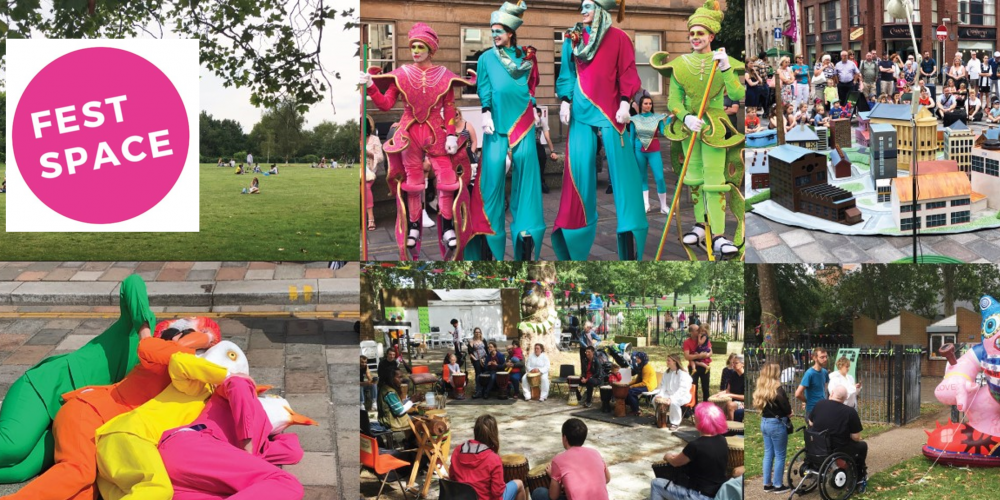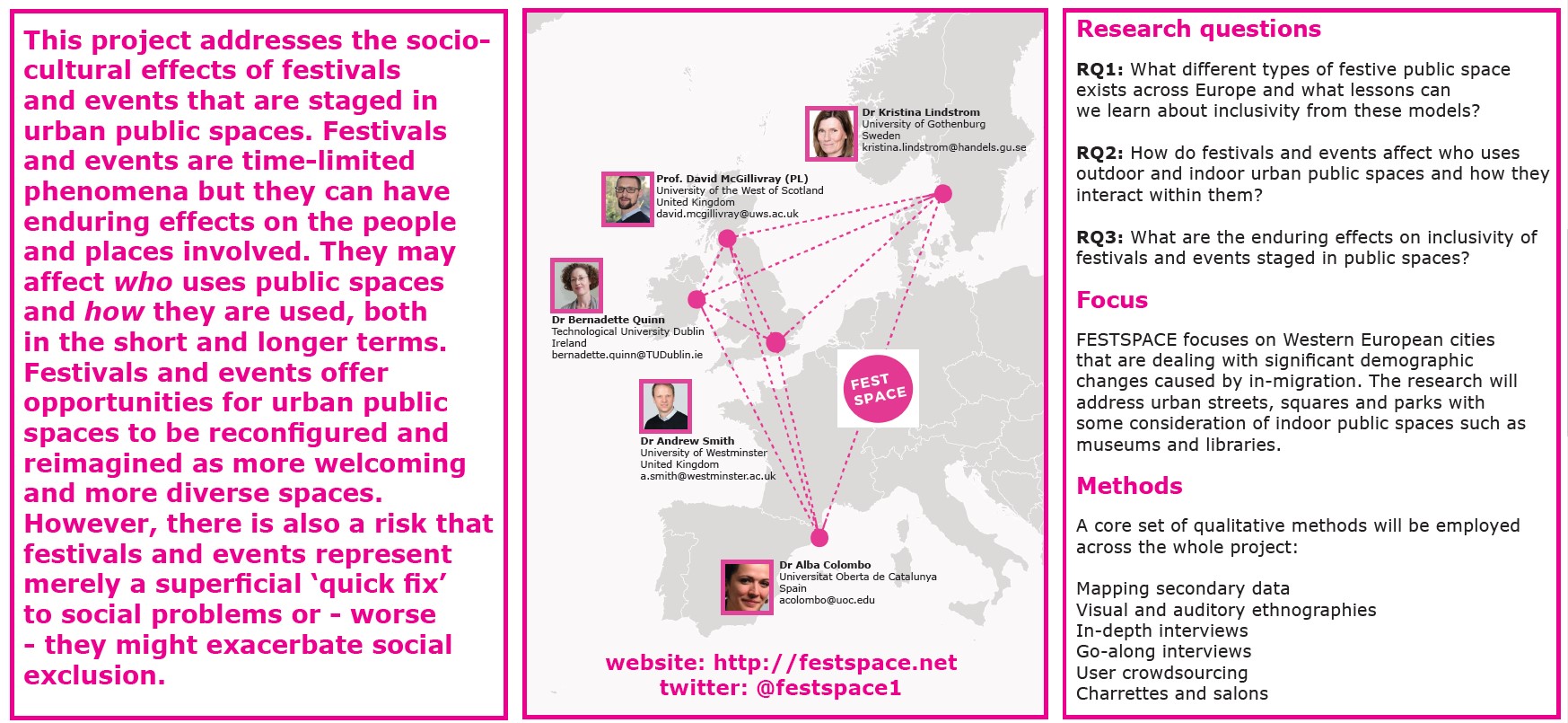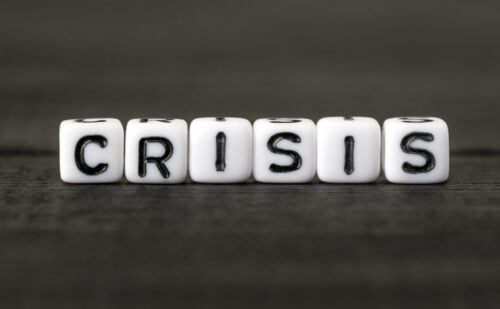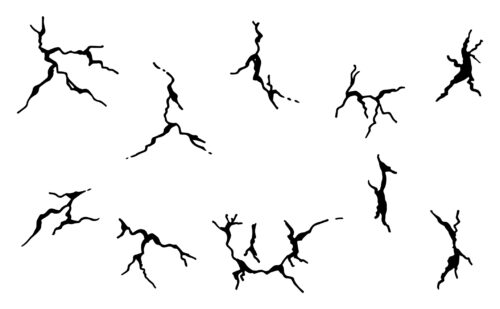
Project of the Month: FESTSPACE
Posted: 15 November, 2021
HERA is pleased to present the next Project of the Month: FESTSPACE – Festivals, events and inclusive urban public spaces in Europe.
The FESTSPACE website showcases the work of the CRP in its totality. Here you can check regular blogposts from team members, links to conferences, workshops and publications.
Project name
FESTSPACE: Festivals, events and inclusive urban public spaces in Europe
Describe your project
The FESTSPACE project focuses on how festivals and events affect the inclusiveness of public spaces. It examines how they enable or restrict access to, and use of, public spaces, including the extent to which they might effectively host interactions and exchanges between people from different backgrounds. The project has partners from the UK (University of the West of Scotland and University of Westminster), Spain (Open University of Catalunya), Sweden (University of Gothenburg) and Ireland (Technological University Dublin).

Describe your project development to date
To date, FESTSPACE has produced a lay literature review on the role of festivals and events in producing inclusive public space and mapped the different types of festive public space that exists in the project’s main sites. In the pre-March 2020 period, we have undertaken significant fieldwork on different types of festivals and events taking place in parks, squares, streets and indoor public spaces, including arts festivals, music concerts, civic displays, and neighbourhood events. We have hosted two academic symposia, several panel workshops, a stream at the Royal Geographical Society conference on ‘Festivals and the City’, published several peer reviewed articles, and presented our work at various national and international conferences.
How did the pandemic impact on the project and how has the project adapted?
We have had to pivot much of our research in light of the pandemic to consider the continuing importance of culture and festivity in spontaneous expressions of community solidarity witnessed during national lockdowns and explorations of the digital public spaces created as a response to the cancellation of events taking place in outdoor public space. We continue to generate interest and engagement with our project and the wider HERA Public Spaces programme through our proactive web and social media communications work.
Since the pandemic began, we have found that people continue to express the need for collective experiences, though most of these currently take place online or under very restricted conditions. We have observed remarkable creativity from communities across our CRP, including festival and event organisers. While prior to the start of the pandemic public spaces were being used intensively for festivals and events, other uses have taken over and there is uncertainty as to how these spaces will be used in a post-pandemic world. In relation to inclusivity, digital public space can reinforce inequities, though online events can also widen audiences and provide safe spaces for marginalised groups to gather and share experiences.
Interesting collaborations / partnerships
Throughout our project we have been working closely with Associate Partners, including the urban designers Austin-Smith: Lord (Glasgow) and artists WAVEParticle.
In London, researchers have worked closely with organisations that represent the managers and users of public parks.
As a project we also collaborated with two other HERA-funded projects, Festiversities and Pleasurescapes to host a webinar focused on the topic Pleasure in Crisis: Resilience of Public Entertainment and Festivity in the Past and Present.
In Barcelona we have established a cooperative relationship and a knowledge exchange program with the ICUB, the Institute of Culture of Barcelona, dependent on the city council.

Academic Publications
- Dr Smith (PI2) & Prof McGillivray (PL) presented their work on events and public space (s) to the Event, Cities and Urbanism conference in Lausanne in early 2020 and their paper, ‘The long-term implications of mega-event projects for urban public spaces’ was published in October 2020 in a Special Issue of the Sport & Society
- Dr Quinn (PI3) led on a FESTSPACE co-authored submission on ‘Festivals, public space and cultural inclusion: public policy insights’ published in the Journal of Sustainable Tourism in December 2020. This article explores how municipal policies address issues of inclusion in their strategic planning and its relationship with the public spaces utilised for festivals and events.
- McGillivray (PL) and Guillard (ECR) published a paper titled ‘Urban connective action: the case of events set in public space‘ in December 2020 in Urban Planning focusing on the intensive use of public space in the city of Edinburgh which has generated significant controversy over the privatisation of public space and its effects on access to public space for residents of the city.
- Dr Smith (PI2) led on a FESTSPACE co-authored paper titled ‘Staging city events in public spaces: an urban design perspective’ published in the International Journal of Event and Festival Management which looks specifically at the way public spaces (squares, streetscapes and parks) have been (re) designed to accommodate festivals and events.
Knowledge exchange and dissemination
- In terms of impact and influence, pre-pandemic, in January 2020, Prof McGillivray (PL) presented to a large audience (circa 750) in Edinburgh on the topic of ‘City for Sale: The Commodification of Edinburgh’s public spaces’ informing special interest groups and other stakeholders of the European and international context influencing the use of public space for (commercial) festivals and events.
- Dr Bernadette Quinn (PI3) gave a keynote address at the Arts Council of Ireland’s ‘Changemakers: the transformative power of festivals’ conference in February 2020.
- In May 2021. Dr Quinn along with Dr Ryan presented a paper on Understanding the library as a commemorative exhibition space at a workshop on “Changing purposes and practices of the public library” organised by Radboud University, Nijmegen.
- Also in May 2021, Dr Quinn, Dr Ryan and Dr Fernandes presented on the topic of Festivals and events as a way to position cities internationally at the AsTRES-ORMES City, Events, Mega Events and Tourism conference. Finally, that same month Dr Quinn and Dr Fernandes presented research on community festivals at the THInC congress on Cultural Diversity and Tourism for Community Development, organised by Lusófona University and Coventry University.
- In February 2021, Dr Andrew Smith (PI2) was invited to give evidence to the UK Government Select Committee Inquiry into The Future of Music Festivals and the evidence he provided about park based festivals featured prominently in the Inquiry report that was published in May 2021.
- During the pandemic, in August 2020, Prof McGillivray (PL) contributed to the initiative, ‘2020: A Year without Public Space under the COVID-19 pandemic’ talking about Innovative Approaches and Creative Practices in Response to the COVID-19 Pandemic.
- In September 2020, Dr Smith (PI2), Dr Vodicka (PI2 ECR) and Dr Guillard (PI1 ECR) hosted an online session titled “Festivals and the City: the Festivalisation of Public Space” as part of the Royal Geographic Society [with IBG] Annual Conference. 10 papers were delivered which were then translated into an open access book commissioned by University of Westminster Press titled ‘Festivals and the City: the Contested Geographies of Urban Events’ due to be published in the spring of 2022.
- Dr Smith and Dr Vodicka launched their report into Events in London’s Parks at a well attended online launch in July 2020. This report was supported and publicised by Parks for London, Go Parks London and Parks Community UK.
- Dr Kristina Lindström (PI4) was invited to participate during the EUTOPIA week in November 2020. As a representative of FESTSPACE and the University of Gothenburg she participated in the panel Futures: Cities of Culture discussing the importance of cultural events, the impact of Covid-19 on the arts and culture and the role of universities in supporting culture and cultural identity.
- Dr Lindström also participated in the panel Festival and events: Social responses to the global pandemic at the ATLAS SIG meeting Event and Cultural Tourism in October 2020.
- In 2019 Dr Alba Colombo (PI5) presented a poster at the ‘2019 Atlas Annual Conference’ on the topic of Tourism transformations.
- In 2020 Dr Colombo participated in the ‘Festivals, Events and Covid-19’ conference organized by the University of West Scotland with a presentation on the “Creative Responses and New Events Formats: Adapting to the New Normal”.
- In October 2020 Dr Colombo joined the ‘ATLAS SIG meeting Events and Cultural Tourism’, together with other members of the FestSpace Barcelona team presenting one papers entitled “Intensities of the Use of Public Space by Cultural Festivals: An Evolutionary Map of Barcelona” (Oliver-Grasiot & Colombo) and organizing and moderating the closing conference’s panel entitled “Festival and Events: Social Responses to the Global Pandemic”.
- M. Luchtman presented a paper on the “Festivals and the City: The Festivalisation of Public Space” at the Royal Geographic Society Annual Conference.
- In February 2021 the FestSpace Barcelona team organized the international seminar ‘Spaces and crowds without festivals. The social effects of a landscape without events during the pandemic.
- More recently, in June 2021 Dr Colombo and Dr Lamas-Abraira has presented the paper ‘The Year of the Ox: Rethinking Chinese New Year festival in Pandemic Times’ at the Chinese Migrations in Europe in the Time of the Covid-19 Pandemic virtual seminar organized by the CNRS (Centre national de la recherche scientifique, France).
The FESTSPACE Team has also participated in a number of non-academic knowledge transfer events, including:
- David McGillivray (PL) hosted a virtual discussion for University of the West of Scotland’s #CCSE Conversations series with Associate Partner Graham Ross from Austin-Smith: Lord on the topic of ‘culture, festivity and creative placemaking’. These conversations are hosted on youtube.
- Andrew Smith (PI2) was asked to speak at two high profile events organised by the architects responsible for the redesign of Grosvenor Square (one of London’s most famous garden squares). The first of these (in June 2020) examined the question: how can urban spaces support our well being?. The second (in July 2020) was based on the question: has the pandemic changed what we want from our green spaces?. These contributions have helped shape the ways the revised design of the square incorporates spaces for events.
- Alba Colombo (PI5) and her team produced a short film (below) on how cultural festivals and events have responded to the pandemic in Barcelona. In September 2021 Dr. Colombo and the Barcelona FestSpace team member Xavier Villanueva presented the FestSpace research at Casa dels Entremesos, a center for production and dissemination of the traditional popular culture in Barcelona
Media contributions
- Andrew Smith’s (PI2) work on park events featured in a piece published by the Guardian in August 2020; entitled Sanctuary in the City: How urban parks saved our summer.
- Andrew Smith (PI2) co-wrote a 1500 word piece for Discover Society on Parks in a Pandemic: A Glimpse of the Future.
- Andrew Smith (PI2) wrote a piece for London Landscapes magazine on the implications of the coronavirus pandemic for the funding and future of London’s parks, and his photograph of Beckenham Place Park featured on the cover.
- Andrew Smith and Goran Vodicka wrote a piece for the Go Parks London website about their research on Events in London’s Parks.
- Bernadette Quinn (PI3) was asked by the Arts Council of Ireland to observe a series of online conversations involving some 100 festivals and to write an essay for publication on the Arts Council website.
- Alba Colombo (PI5) work on festivals in pandemic times featured in two articles published by the national media Diario Público in 2020:
- The popular festivals resist: the importance of the party in post-Covid times
- Pandemic celebrations: between caution and collective lag
- In 2021 Jordi Oliva, researcher of the Barcelona FestSpace Team , wrote a piece for The Conversation on Taking advantage of pandemic to boost sustainable and inclusive events
- The FestSpace Barcelona team work on popular culture festivals and the Barcelona Festa Major, La Mercè (the main festivity of the city, held annually) featured, besides many local and regional media, three national newspapers:
- https://www.20minutos.es/noticia/4831040/0/el-pregon-de-la-merce-ha-ido-abandonando-el-contenido-religioso-para-hacerse-mas-ciudadano-y-democratico/
- https://www.elnacional.cat/es/barcelona/pregones-merce-historia_648749_102.html
- https://www.elperiodico.com/es/barcelona/20210923/pregones-bcn-redencion-cautivos-banca-12109399

Source: Barcelona city Council image bank. Authors: María López y Javier de la Riba (poster) and Christian Bertrand (concert stage)

